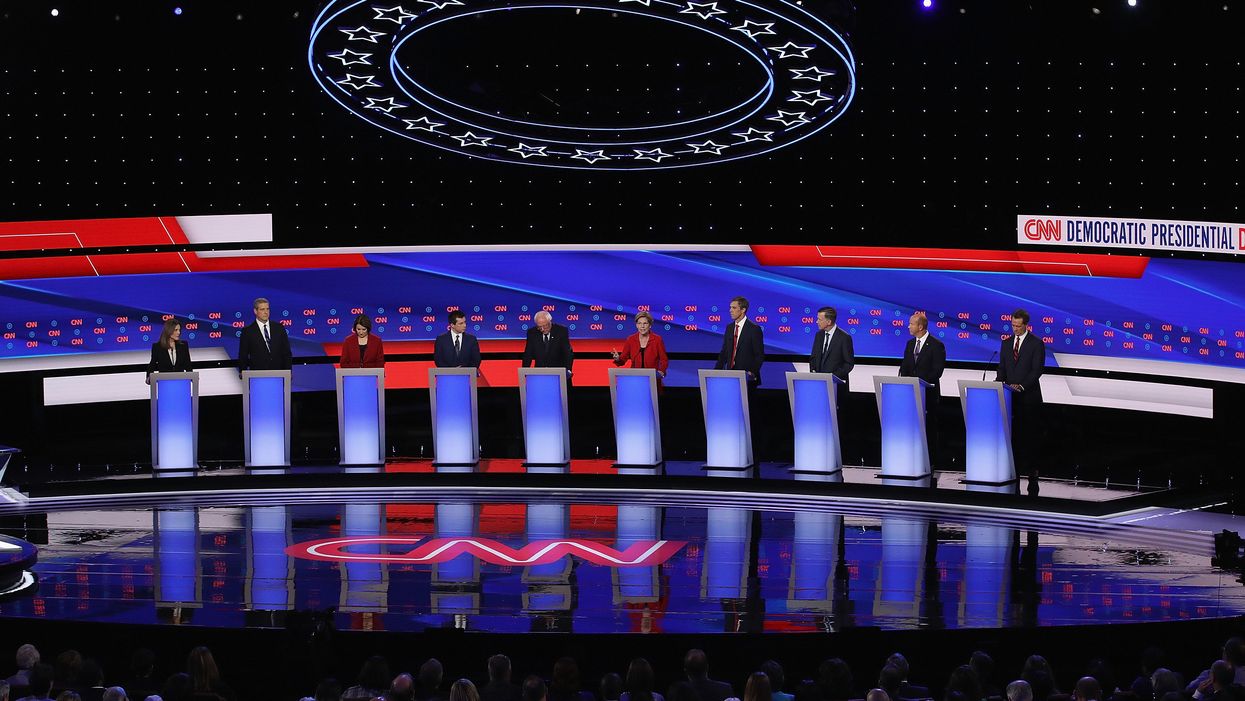Democracy reform once again simmered on the back burner as other issues, dominated by health care and immigration, boiled over on the first night of the second round of Democratic debates.
The moderators didn't ask any direct questions about campaign finance reform, expanding access to the ballot box or amending governing systems. But seven of the 10 presidential candidates on stage Tuesday night still managed to underscore their interest in making big changes to the political system.
Mayor Pete Buttigieg of South Bend, Ind., had a stand-out moment when he promoted several fundamental overhauls to the current rules of campaigns and governing.
"Of course we need to get money out of politics," he declared. "But when I propose the actual structural democratic reforms that might make a difference — end the Electoral College, amend the Constitution if necessary to clear up Citizens United, have D.C. actually be a state and depoliticize the Supreme Court with structural reform — people look at me funny, as if this country were incapable of structural reform," he said.
The others who talked about fixing democracy's malfunctions did so mostly by lamenting big money's influence on elections.
Here's a by-the-numbers look at democracy reform's place in the debate.
27 and 23 — Minutes and seconds, until the first mention of anything related to democracy reform. Sen. Bernie Sanders of Vermont spoke about reining in special interest driving health care policy in Washington, saying:
"Nobody can defend the dysfunctionality of the current system. What we are taking on is the fact that over the last 20 years the drug companies and the insurance companies have spent $4.5 billion of your health insurance money on lobbying and campaign contributions."
10 — Mentions of 'reform.'Five came from Buttigieg, who was also the only candidate to utter the phrase "structural reform." Rep. Tim Ryan of Ohio mentioned reform — but not in a rah-rah way: "I'm here to say this isn't about left or right. This is about new and better. It's not about reforming old systems. It's about building new systems," he said.
10 — Digs at money in politics. Sen. Amy Klobuchar of Minnesota panned the influence of the National Rifle Association's "big money" in stopping gun control legislation. Former Rep. Beto O'Rourke of Texas vowed to ban members of Congress and federal candidates from accepting donations from political action committees. Gov. Steve Bullock of Montana knocked dark money. Sanders invited fellow candidates to reject money from drugmakers and insurance companies.
4 — References to Citizens United. Buttigieg and Bullock both derided the Supreme Court's 2010 ruling that gave rise to unlimited spending by corporations and unions to influence elections.
3 — Shots at lobbying. Who's happy with how things work in Washington? The wealthy and those "who can hire armies of lobbyists and lawyers," Sen. Elizabeth Warren of Massachusetts said.
2 — Candidates who said nothing of these issues. Former Rep. John Delaney of Maryland and former Gov. John Hickenlooper of Colorado were both silent.
1 — Candidate who remembered voting rights. You might say O'Rourke is excited about his voting rights plan: "Today, as president, I will sign into law a new Voting Rights Act," he said. To be fair, he was the only candidate to even nod at expanding ballot access.
0 — Mentions of election security. The CNN moderators must have forgotten about what intelligence officials say is the greatest threat to our democracy. None of the candidates bothered to remind them.
Reform quotes of note
Author Marianne Williamson: "The issue of gun safety, of course, is that the NRA has us in a chokehold. But so do the pharmaceutical companies, so do the health insurance companies, so do the fossil fuel companies, and so do the defense contractors. And none of this will change until we either pass a constitutional amendment or pass legislation that establishes public funding for federal campaigns."
Bullock: "Washington, D.C., is captured by dark money, the Koch brothers, and others. That's been the fight of my career. Kicking the Koch brothers out of Montana, taking the first case after Citizens United up to the Supreme Court, making it so that elections are about people. That's the way we're actually going to make a change on this."
O'Rourke: "As president, we will make sure that we ban political action committee contributions to any member of Congress or any candidate for federal office. We will listen to people, not PACs; people, not corporations; people, not special interests."
Warren: "Our biggest problem in Washington is corruption. It is giant corporations that have taken our government and that are holding it by the throat. And we need to have the courage to fight back against that."
Buttigieg: "This is a country that once changed its Constitution so you couldn't drink and changed it back because we changed our minds. You're telling me we can't reform our democracy in our time? We have to, or we will be having the same argument 20 years from now."



















